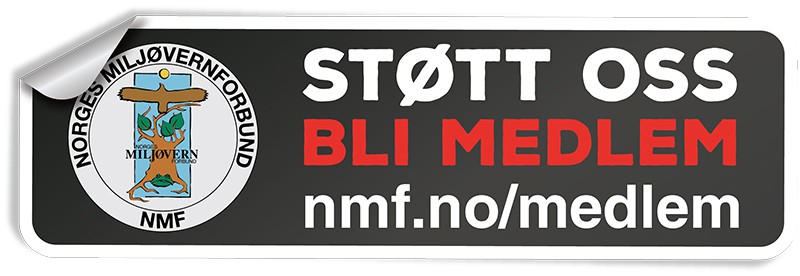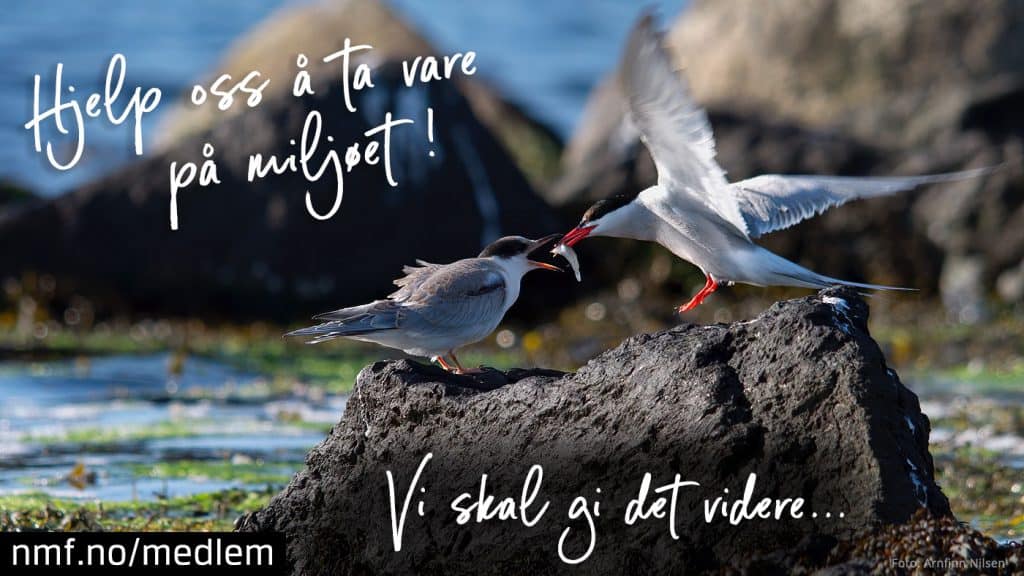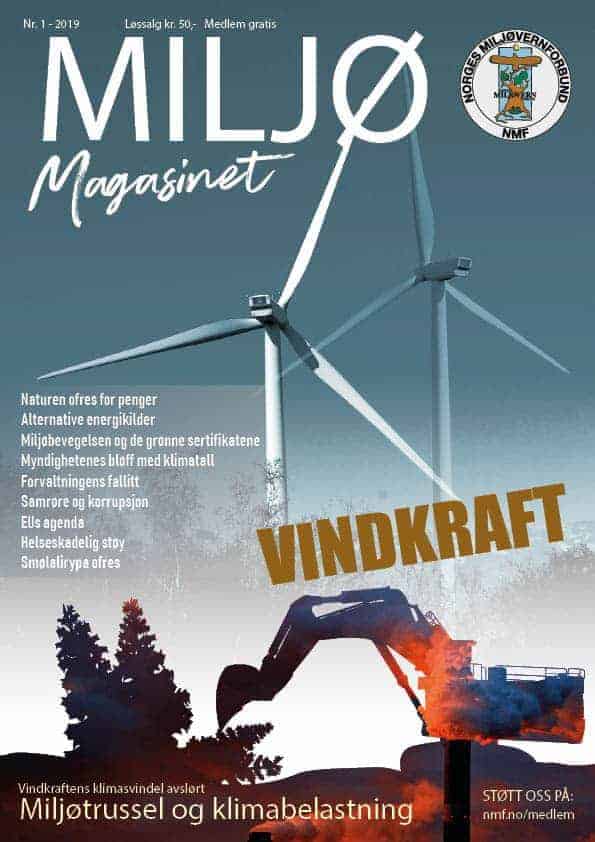On 26 March 2020, Germany's ambassador to Norway, Alfred Grannas sent a fairly undisguised threat to the Norwegian state at the Ministry of Oil and Energy.
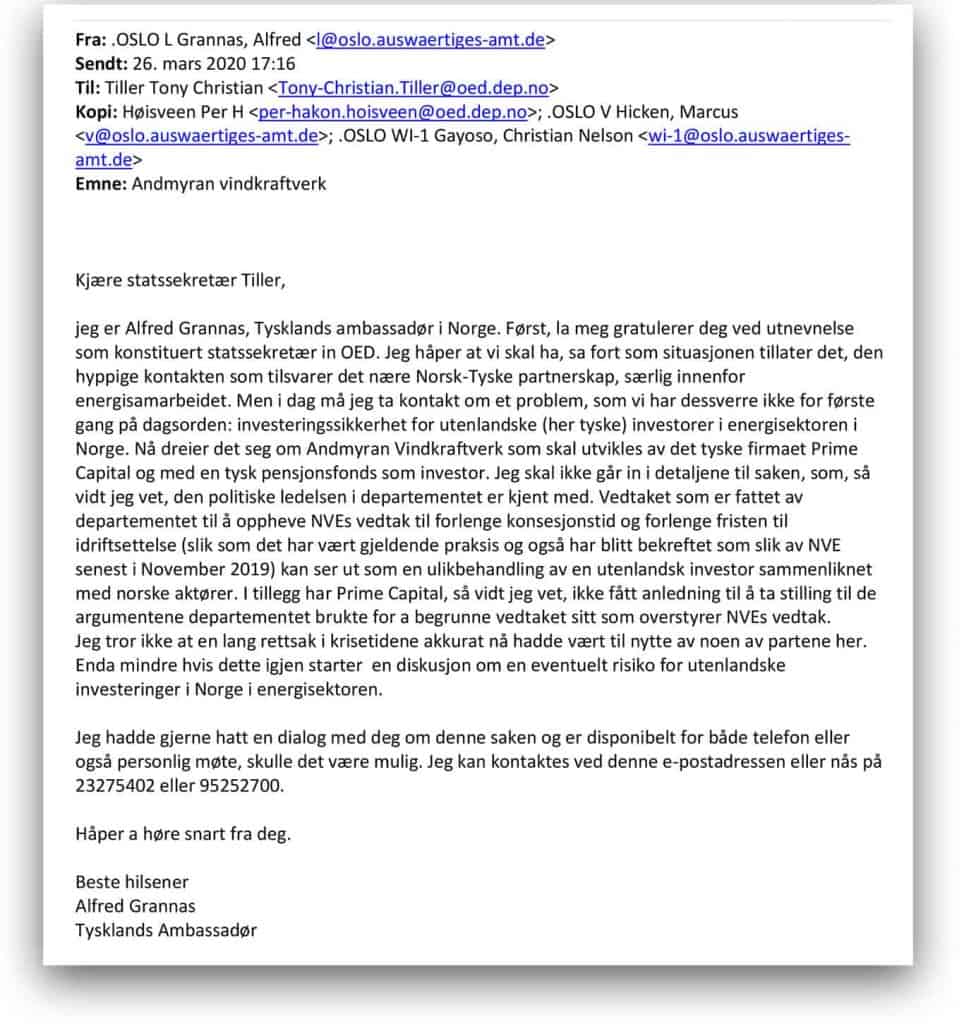

A fairly undisguised threat…
When the German ambassador to Norway, Alfred Grannas, sent an email to the Norwegian government at the Ministry of Oil and Energy (OED) on 26 March, it was a fairly undisguised threat. The case concerns the Andmyran Wind Power Plant in Nordland where NVE had adopted a postponed deadline and extended concession period, despite strong protests and complaints, was converted in the OED. Andmyran wind power plant has changed owners a number of times over the years, and the German fund manager Prima Capital AG bought 100% of the shares on behalf of the group company Prime Scandic S.à rl from the Swedish listed Wallenstam group on 26/09/2019. Now with new German ownership interests, the German authorities are showing power...
Jeg tror ikke at en lang rettsak i krisetidene akkurat nå hadde vært til nytte av noen av partene her. Enda mindre hvis dette igjen starter en diskusjon om en eventuelt risiko for utenlandske investeringer i Norge i energisektoren.
Tysklands ambasadør i Norge, Alfred Grannas
This can hardly be misunderstood. Here, the German state threatens Norway with legal proceedings, if the matter cannot be resolved in another way. The ambassador further writes that he wants a dialogue about the matter. If this does not lead to progress, then a long and expensive lawsuit against Norway from Germany awaits...
Not the first time Germany threatens Norway
It was no further back than when the Frøya case was up for consideration in the Ministry of Municipal Affairs and Employment (KMD) last year that the German embassy last broke into the proceedings before the decision was made. The meeting with the German embassy was held at KMD on 13/06/2019, but no minutes were written from this meeting, but it is easy to add the same 2 + 2, especially in light of this letter from the German embassy...
Men i dag må jeg ta kontakt om et problem, som vi har dessverre ikke for første gang på dagsorden: investeringssikkerhet for utenlandske (her tyske) investorer i energisektoren i Norge.
Tysklands ambasadør i Norge, Alfred Grannas
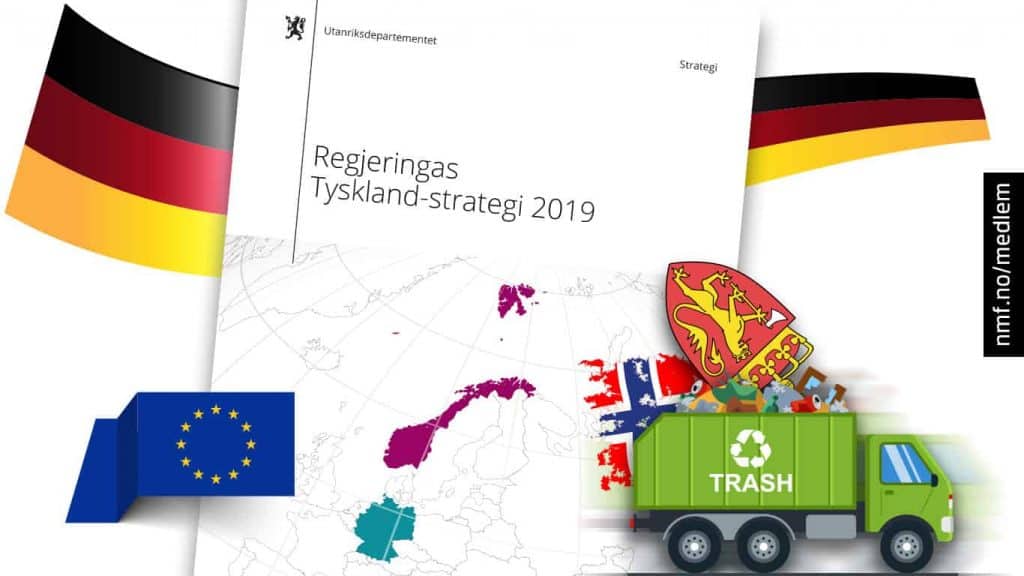
Excerpt from the government's Germany strategy 2019
10 Energy, climate and environmental policy
Goal
Norway must continue to be a stable and safe supplier of energy to the German market and an important contributor and cooperation partner for Germany's efforts for energy transition and climate goals, with the advantages it provides for Norwegian value creation. Continue the dialogue with Germany on climate and environmental policy to promote a green economy and low-emission development in Europe.Measures
- Vidareføre dialogen om energi på politisk nivå mellom Olje- og energidepartementet og det tyske økonomi- og energidepartementet og mellom utanriksdepartementa. Oppfølging: Olje- og energidepartementet, Utanriksdepartementet og ambassaden i Berlin.
- Vidareføre den årlege dialogen på embetsnivå om energi, klima og utanrikspolitikk mellom det norske og det tyske utanriksdepartementet.
Oppfølging:
The Ministry of Foreign Affairs, with support from the Ministry of Petroleum and Energy and the Ministry of Climate and Environment.
- Read about the government's Germany strategy 2019
- Read the government's Germany strategy 2019 (document/PDF)
Norway, a colony under the EU
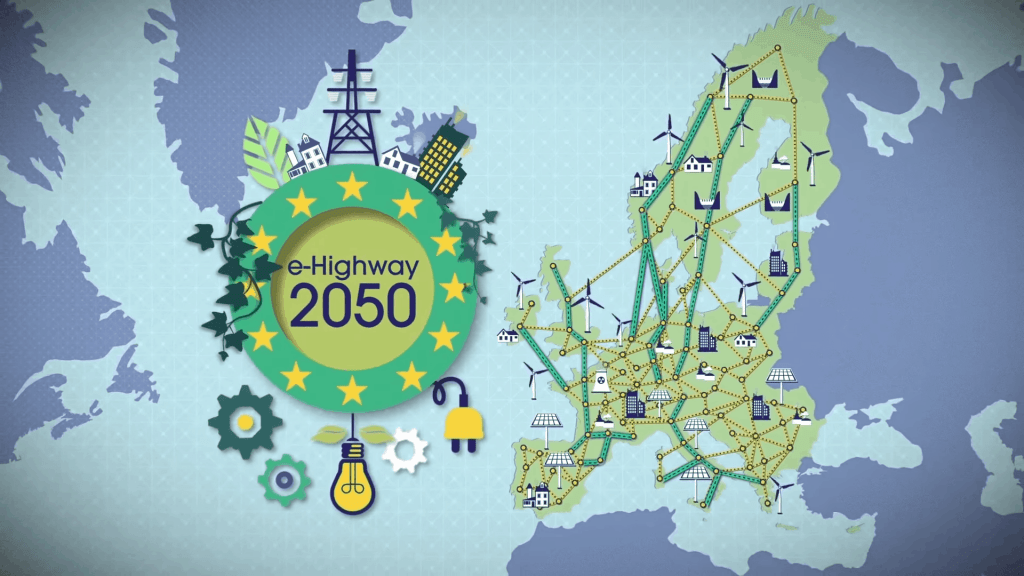
Most people have probably heard the expression "Norway is Europe's green battery"...
Norway has had good cooperation with Germany for many years. In many ways a much too good collaboration. We have been through two referenda for the EC and the EU with a clear NO both times. Despite this, through the subsequent EEA agreement and a number of directives and agreements, we have made Norway a purely sound kingdom of the EU. We are no longer masters of our own house. Also on the energy front, all power and decision-making is transferred to the EU's bodies, and we no longer have the right to control our own energy policy. The EU's Renewable Energy Directive and ACER are just some of the many laws and regulations to which we have given up power. In addition, the government has drawn up its own action plan for Germany. On the government's website for Germany's strategy, Germany is Norway's most important partner in Europe.
- Read about the government's Germany strategy 2019
- Read the government's Germany strategy 2019 (document/PDF)
Read more about the background for Europe's energy policy towards Norway, and much more in The environmental magazine:
Little Norway with all the resources, and Germany with all the industry and the financial muscles.
We have now heard from most of our politicians, both in Parliament and in the Government, that Norway will now willingly and obediently lie down and be Europe's battery. All our power is now made even more available, than it already is, to a thirsty and insatiable Europe.
We have now ended up as a simple colony under the colonial power of the EU, where the colonial masters can freely extract everything they can carry with them from the Norwegian natural resources. The Norwegian authorities have lost all management and control and can no longer make decisions in Norwegian administrative matters before the colonial masters again threaten legal proceedings and compensation claims in the hundreds of millions, for each decision.

German muscles against Norwegian local communities...
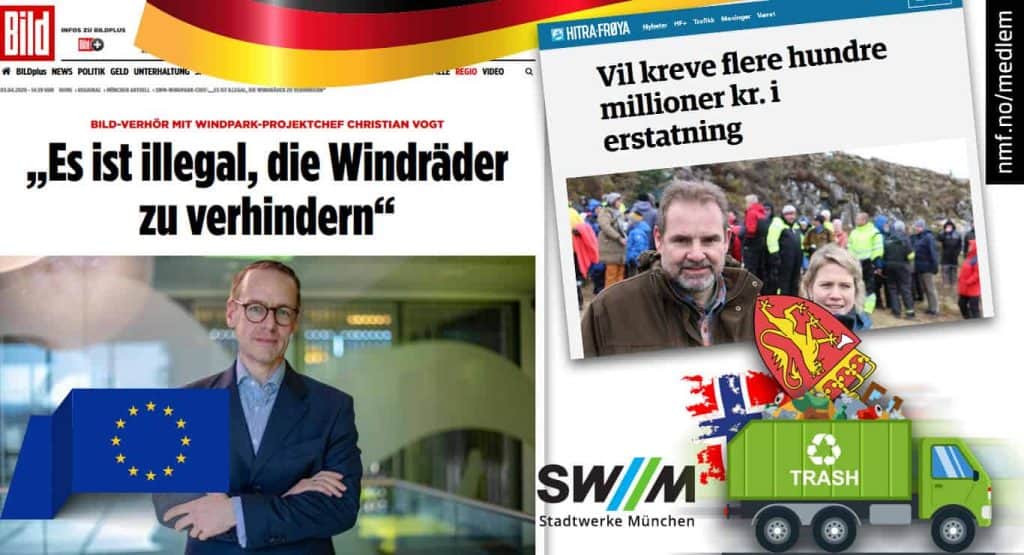
The media picture in 2019 was clearly marked by the Frøya case, which was really the case that woke Norway up. Sarepta Energi AS, which later became Trønderenergi, had, among other things, applied for a license on Frøya and on Sørmarkfjellet in Trøndelag. The concessions were old, and the impact assessments were clearly marked by this in that they were both outdated and deficient. In addition, the turbine height was to be increased from 130 to 180 meters on Frøya, and on Sørmarkfjellet they were to build a new route in an area that the Norwegian Environment Agency classified (05.05-2015) as a natural area of great national value.
And what do you do when you have to push through a controversial wind power plant in front of the Norwegian authorities? Yes, you use German financial muscle. This is a method we find in a large number of wind power cases. You first ensure that you get an approved license to use small turbines, and when the license is in place, you sell off the majority of the shares to a foreign company. In this way, they enter into a deadly symbiosis, where the foreigners provide the financial and governmental strength, while you yourself act as physical muscle men who push the decision through above the local population and out into the terrain. In many ways a type of lackey business where you do all the practical work yourself, while the foreign players contribute with financial strength, and with their respective states as back cover.
Foreign muscles more common than you might think…
For Trønderenergi, this relationship consists of a 70% ownership from the publicly owned regional power plant, Stadtwerke München, but one is left with 30% ownership and a good chunk of money. The same model can be found all over the country, and we only mention a few here;
At Kjølberget in Finnskaogen, Austri Vind has 40% and German Stadtwerke München 60%. At Vardafjell in Sandnes, Nordisk Vindkraft just as easily sold the entire 100% to a French company, while they themselves were "hired" to build and operate. The city of Zurich with its energy company EWZ Zurich operates according to the same model as Stadtwerke München, where they exploit other countries for natural resources, while taking care to keep their own landscapes as free from the destructive wind turbines as possible. They are happy with their landscape and of course do not want to destroy their own tourism industry.
Other companies also work in the same way. At Haramsøy, a Finnish company owns most of the shares. In several cases, including in Western Norway, the Milan-based Falch Renewables is active in partnership with SFE, Sogn og Fjordane Energiselaska and is also owned by BKK. In Okla (Bremangerlandet), it is the gang from Milan that owns the entire facility. Here, the same model is used throughout in most wind power cases. Strong foreign pressure combined with cowardly bureaucrats and politicians provides no security for the Norwegian community. Here, our country will be served on a silver platter and sold out, bit by bit until there is nothing left...
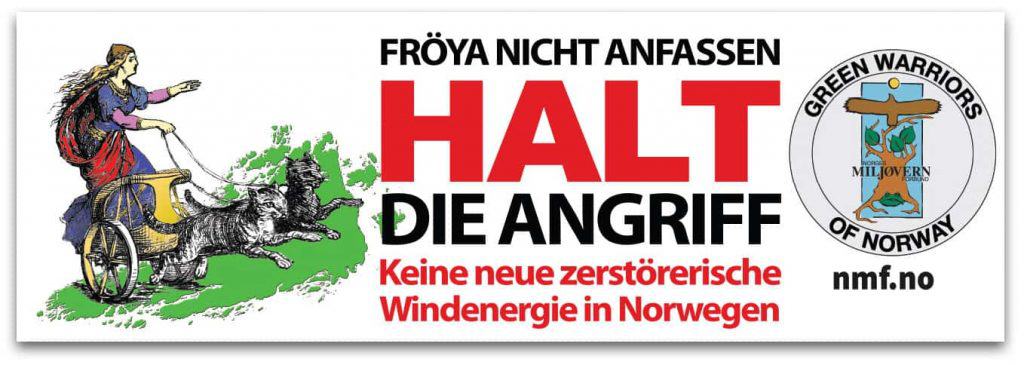
Money, money, money…
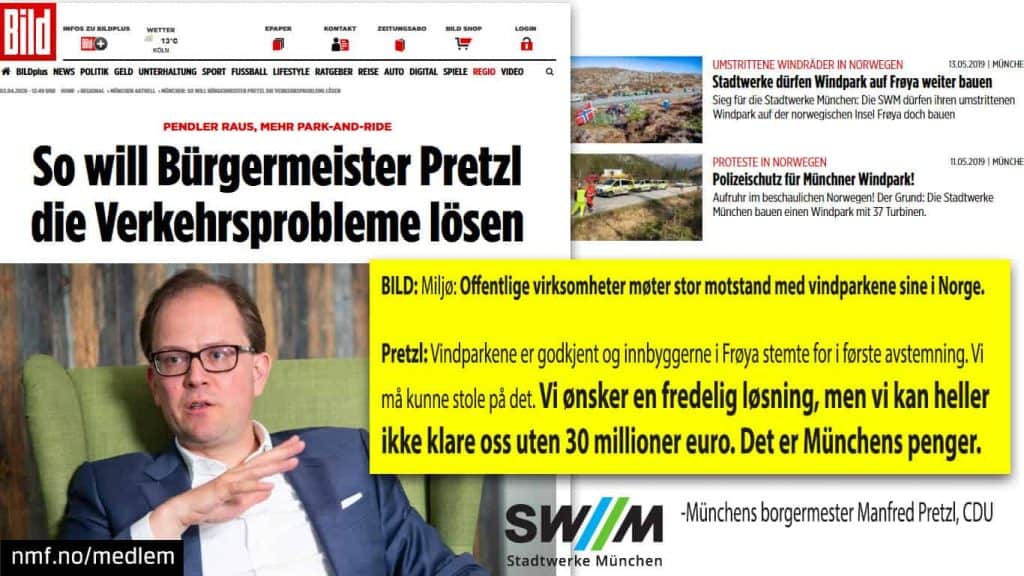
It is no coincidence that Germany, through its Norwegian embassy, is showing muscle and acting more and more aggressively towards the Norwegian authorities. If we take the energy company Stadtwerke München as an example, they are publicly owned by the city of Munich. Munich Mayor Manfred Pretzl, CDU has clearly involved himself in the matter. Above the Frøya case, he said to the German Bild, "We want a peaceful solution, but we also cannot manage without 30 million euros. It's Munich's money”.
This very well explains both Trønderenergi and Stadtwerke München's unreasonably high 400 million threat to the municipal council in Frøya just before the matter was to be voted on, and also the German embassy's threat to the Norwegian authorities.
Det er ganske tydelig at vi nå ikke lengre er herrer i eget hus, men på mange måter kun en liten simpel koloni under EU. Det var definitivt ikke dette det norske folket ga tillatelse til da vi stemte NEI til EF/EU i begge folkeavstemningene.
Nå er det viktig at norske politikere og myndigheter bretter opp ermene og viser muskler mot EU. Gjør de ikke dette nå, så kommer et nytt folkekrav på bordet temmelig snart og Norge blir neste land i rekken for et nytt Brexit. Dette finner vi oss ikke i lengre…
- The Norwegian Environmental Protection Association is asking the police chief in Oslo to blow up a BMW outside the German embassy
- Les Miljøvernforbundets pressemelding i forbindelse med aksjonen foran den tyske ambassaden 28.09.2020 NMF_pressemelding_demonstrasjon_tysklands_ambassade-3.pdf
- Oddekalf smashed the BMW in front of the German embassy
